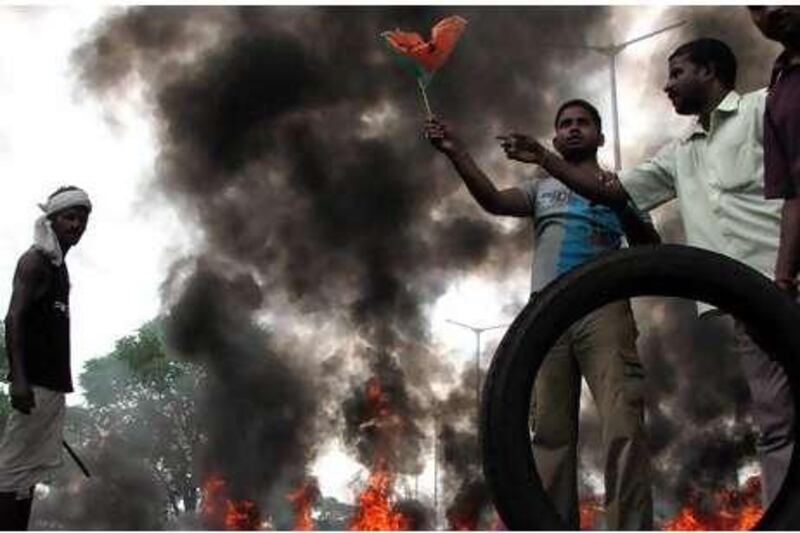KOLKATA, INDIA // The arrest of two Indian army officers in a bomb attack that killed seven people could mean the upper echelons of the armed services have been infiltrated by Hindu extremists, analysts say. Lt Col Shrikant Prasad Purohit, who is the first serving officer in the army to be arrested on terrorism charges, and Ramesh Upadhyaya, a retired major, appeared in court last week on suspicion of involvement in an attack in September in the Muslim-dominated textile town of Malegaon.
The Anti-Terror Squad (ATS), from the state of Maharashtra, where the blast took place, said three more Hindu army officers, including two colonels, could be involved in the terrorism network. Their roles in bombing cases blamed on Hindu extremists are under investigation. The Malegaon blast is one of several over the past few years, where the victims were mostly Muslim, that has been blamed on Hindu nationalist groups accused of stirring political violence.
Afsar Karim, a retired major general, said: "The Indian army never had such a case when an officer has become [an accused] terrorist. "It is a question of the infiltration of radical groups in the Indian army. The groups have been trying it for a long time." AK Anthony, the defence minister, said the involvement of a serving army officer in a terrorist blast was "a matter of serious concern" and the defence authority was "very determined to go to the root of the whole thing".
Army authorities said the arrest of Lt Col Purohit had dented the image of the force. "The Indian army's prestige has been hurt after our officer's name came up in the Malegaon blast case," said Lt Gen SPS Dhillon, the deputy chief of staff of the Indian army. The ATS said Lt Col Purohit and Mr Upadhyaya steered the Malegaon terrorist attack "like a disciplined army operation". The pair, both Hindus, are founding members of Abhinab Bharat, a right-wing Hindu group, and they trained Hindu militant cadres in firearms and explosives secretly, according to the ATS.
They were alleged to have procured explosive materials and helped make the bombs used in the attack. Lt Col Purohit confessed his involvement in the attacks after investigators produced a transcript of text messages including "we are on the radar of ATS" and "change the SIM card", which he is said to have sent to Mr Upadhyaya a few days after the blasts. Police investigating the blast initially thought Islamist radicals were behind the attack, despite the blast apparently targeting Muslims.
However, work by forensic experts and the ATS revealed that the explosives-laden motorbike used in the attack was owned by Prajna Singh Thakur, a Hindu nun, who gave it to Ramji Kalsangre, who is accused of planting the bomb in Malegaon. The leads led police to claim that they had unearthed a "Hindu terrorism" network that has been targeting minorities across the country, possibly for several years.
Eleven Hindu activists, including Lt Col Purohit, have been arrested by ATS in connection with the Malegaon bombing. One ATS officer, who did not want to be named, said: "The network is spread across some other states where from local police we are not getting best co-operation in our investigation and this is the biggest hurdle we are facing in this case now. "It is clear that this [Hindu] terrorist network is responsible for bombing at many other places across India over some years," he said.
Writing in the Mail Today, a New Delhi newspaper, Manoj Joshi, a veteran commentator, said: "The arrival of Hindutva terrorism in India - via the Malegaon and Modasa blasts arrests - has been anticipated for some time now. "Between 2003 and 2006, there have been several unexplained and unsolved bombings targeting Muslims in many small towns of Maharashtra? In all these cases, police carried out some investigations and interrogated members of the Bajrang Dal, and other Hindutva bodies. In most cases the trail ran cold."
Analysts say for almost two decades Hindu militant groups, such as Bajrang Dal, have been involved in militant activities against minorities and in the past few years some splinter Hindu groups have taken to bombing what by many are viewed as "revenge" attacks. "Hindus are dying [in the hands of Muslim terrorists]. There is a need to fight Muslims head on. We have to prove that we are not eunuchs," said Himangshu Phanse, a former weapons instructor with right-wing Hindu group of Rashtriya Swayamsevak Sangh, several months before he died in 2006 while making a bomb in the Maharastrian town of Nanded.
"Counter-attacks are the only way to teach them a lesson and avenge Muslim terror attacks." Abdur Rauf, a commentator from Kolkata, said, "Even attacks on mosques and Muslim masses have been blamed on Islamic militants. Hindu-heavy communally biased police forces kept shielding those Hindu terrorists and falsely implicated innocent Muslim youths for terror attacks on Muslims. "We always believed that the army could never be communal and so during communal riots minorities have always sought intervention of army, instead of police. But now this unprecedented involvement of army officers in such communal terror attacks has proved that we were wrong."
* The National





